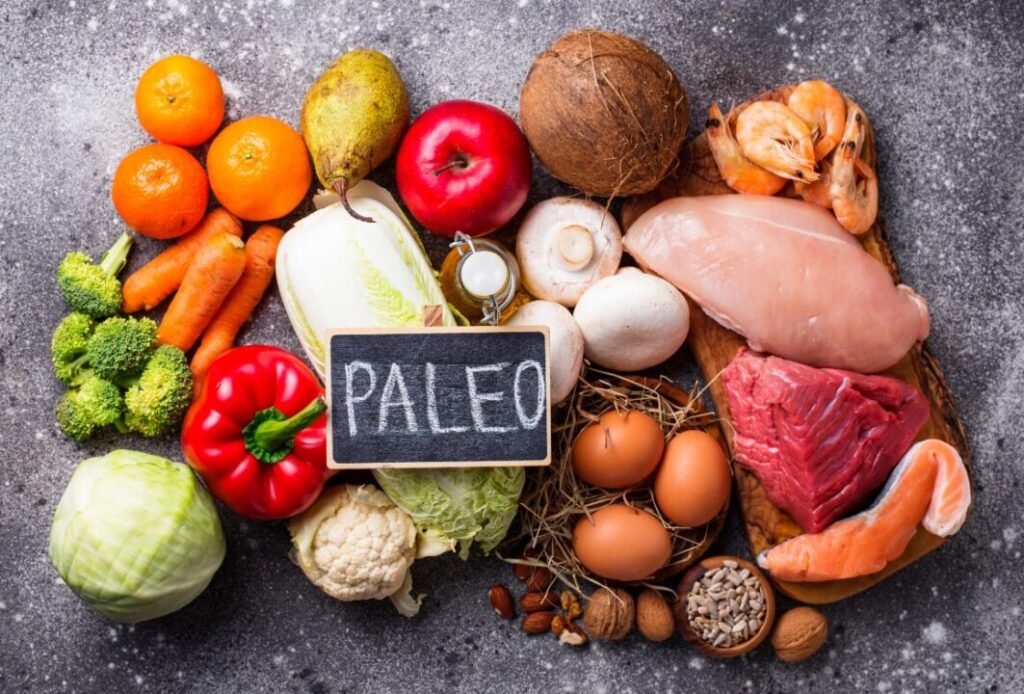Curious about the Paleo Diet’s popularity?
It’s loved for mimicking ancestors’ diets. This plan focuses on whole, unprocessed foods like lean proteins, fruits, veggies, nuts, and seeds.
By ditching processed foods and sugars, you’ll improve health.
The diet prioritizes essential nutrients and antioxidants, aiding in weight loss and digestion.
Athletes find it beneficial too. While controversies exist, the Paleo Diet offers unique insights into our dietary past.
See how it impacts health, weight, and ancestral connections.

Origins of the Paleo Diet
The Paleo Diet originated from the concept of eating like our ancestors.
Despite misconceptions, the diet isn’t about replicating the exact meals of ancient humans but rather focuses on consuming whole, unprocessed foods.
Debunking paleo myths is essential to understanding the diet’s true essence.
Many believe that the Paleo Diet is primarily meat-based, but it actually emphasizes a balance of lean proteins, fruits, vegetables, nuts, and seeds.
Another common misconception is that grains are entirely off-limits, yet some versions of the diet allow for limited consumption of certain grains.
Key Principles of the Paleo Diet
Exploring the Paleolithic Diet further, its key principles revolve around prioritizing whole, unprocessed foods for peak health and well-being.
The emphasis is on consuming food sources that our ancestors would have hunted or gathered, such as lean meats, fish, fruits, vegetables, nuts, and seeds.
By focusing on these natural food sources, you can achieve a better overall nutrient balance, providing your body with essential vitamins, minerals, and antioxidants.
This diet encourages you to avoid processed foods, grains, dairy, and sugars, which can lead to inflammation and health issues.
Embracing the principles of the Paleo Diet empowers you to take control of your diet, supporting your body with the nourishment it needs to thrive.
Emphasis on Whole Foods
To truly embrace the Paleo Diet, prioritize whole foods for peak health and vitality.
When you focus on nutrient-dense options like lean meats, fish, fruits, vegetables, nuts, and seeds, you’re choosing clean eating that fuels your body efficiently.
By opting for whole foods in their natural state, you avoid processed products filled with additives and preservatives.
The emphasis on nutrient density guarantees that you get the most out of every bite, providing your body with essential vitamins and minerals for peak functioning.
Clean eating through whole foods allows you to nourish yourself while enjoying the freedom of making informed choices that support your overall well-being.
Embrace whole foods on the Paleo Diet for a vibrant and energized lifestyle.
Impact on Health and Weight Loss
Opt for nutrient-dense whole foods on the Paleo Diet to experience a positive impact on your health and weight loss goals.
By focusing on lean proteins, fruits, vegetables, nuts, and seeds, you can boost your metabolism and reap the benefits of the Paleo lifestyle.
These whole foods provide essential nutrients that support your overall well-being and help you maintain a healthy weight.
The Paleo Diet encourages you to avoid processed foods and added sugars, which can lead to weight gain and health issues.
Embracing this way of eating can help you feel more energized, improve your digestion, and enhance your body composition.
Make the choice to prioritize your health and weight loss by following the principles of the Paleo Diet.
Connection to Ancestral Eating Habits
You can trace the Paleo diet’s roots back to ancestral eating patterns.
By adopting an evolutionary diet approach, this dietary plan aims to mirror historical dietary influences.
Understanding the connection to our ancestors’ food choices forms an essential aspect of the Paleo diet’s philosophy.
Ancestral Eating Patterns
Ancestral eating patterns provide valuable insights into the dietary habits of our predecessors and their connection to our modern food choices.
Our ancestors followed an evolutionary nutrition based on a hunter-gatherer lifestyle. They consumed whole foods like lean meats, fish, fruits, vegetables, nuts, and seeds.
These foods were nutrient-dense, free from processed sugars, and rich in essential vitamins and minerals.
Evolutionary Diet Approach
Exploring the evolutionary diet approach reveals a direct link to our ancestral eating habits and offers valuable insights into optimizing our modern nutrition.
By considering the nutritional benefits and evolutionary perspective of our ancestors, you can tailor your diet to better suit your body’s needs.
The evolutionary diet approach emphasizes consuming whole foods, lean proteins, fruits, and vegetables, mirroring what our early ancestors would have eaten.
This approach can help you maintain a healthy weight, improve digestion, and boost overall well-being.
Understanding the evolutionary perspective behind this diet can empower you to make informed choices about what you eat, enabling you to thrive in today’s fast-paced world while staying connected to the natural rhythms of our past.
Historical Dietary Influences
Examining historical dietary influences provides a fascinating insight into the connection between our eating habits today and those of our ancestors.
Our ancestors’ diets were shaped by cultural influences and the availability of resources, leading to a dietary evolution that has influenced our modern-day food choices.
Understanding the historical context of our diets can help us make more informed decisions about what we eat and how it impacts our health.
Cultural influences, such as traditional food preparation methods and culinary practices passed down through generations, play a significant role in shaping our dietary preferences.
Paleo Diet and Inflammation
When following the Paleo diet, you’ll discover its impact on inflammation and the body’s response.
The diet emphasizes whole foods that are known for their anti-inflammatory properties.
Inflammation Response in Paleo
The Paleo diet is known for its potential to reduce inflammation in the body through emphasizing whole foods and eliminating processed ones.
Dietary factors play a significant role in the inflammation response within your body. By adopting a Paleo lifestyle, you can support your gut health and strengthen your immune system.
Processed foods often contain additives and preservatives that can trigger inflammation, while whole foods like lean meats, fruits, and vegetables have anti-inflammatory properties.
This way of eating allows you to take charge of your health by providing your body with the nutrients it needs to function at its best.
Embracing the Paleo diet can help you combat inflammation and promote overall well-being, giving you the freedom to live a vibrant and active life.
Anti-Inflammatory Foods in Paleo
To better understand the impact of the Paleo diet on inflammation, let’s explore the role of anti-inflammatory foods within this eating approach.
The Paleo diet emphasizes whole foods like fruits, vegetables, nuts, seeds, and lean proteins, which are known for their anti-inflammatory benefits.
These foods can help reduce inflammation in the body, potentially lowering the risk of chronic diseases.
When planning your Paleo meals, focus on incorporating plenty of colorful fruits and vegetables rich in antioxidants, omega-3 fatty acids from sources like salmon and chia seeds, and spices like turmeric and ginger known for their anti-inflammatory properties.
Sustainability and Environmental Impact
Considering the Paleo diet‘s emphasis on consuming whole foods and minimizing processed products, its sustainability and environmental impact are key factors to evaluate.
By focusing on environmental sustainability and ethical sourcing, the Paleo diet encourages making eco-friendly choices.
Opting for locally sourced, organic produce can reduce the carbon footprint associated with food transportation. Choosing grass-fed meats from humanely raised animals supports ethical farming practices.

Paleo Diet for Athletes and Fitness Enthusiasts
When it comes to optimizing performance and fueling your workouts, the Paleo diet offers unique benefits for athletes and fitness enthusiasts.
The emphasis on whole foods such as lean proteins, fruits, vegetables, and healthy fats can contribute to improved performance benefits and quicker recovery times after intense workouts.
With the Paleo diet, nutrient timing is essential, as consuming the right nutrients before and after workouts can enhance energy levels and aid in muscle repair.
While the diet typically provides a wide array of essential nutrients, some athletes may choose to incorporate supplements to meet specific needs.
Criticisms and Controversies Surrounding Paleo
Despite its popularity, the Paleo diet has faced numerous criticisms and controversies that question its long-term sustainability and nutritional adequacy.
Some detractors argue that the diet’s emphasis on eliminating entire food groups like grains and dairy may lead to nutrient deficiencies.
Critics also point out the lack of scientific evidence supporting the diet’s claims of mimicking our ancestors’ eating patterns accurately.
Additionally, the strict dietary restrictions imposed by the Paleo diet can make it challenging for individuals to adhere to in the long run, potentially leading to feelings of deprivation and social isolation.
While some people may experience short-term benefits from following the Paleo diet, it’s crucial to take into account these criticisms and controversies when deciding if it’s the right approach for you.

Last Words
The Paleo diet’s popularity stems from its emphasis on whole foods, connection to ancestral eating habits, and potential health benefits.
While critics raise concerns about sustainability and its restrictive nature, many individuals have found success in improving their health and managing their weight through following the principles of the Paleo diet.
Whether you’re an athlete or simply looking to make healthier choices, the Paleo diet may be worth exploring for its potential benefits.

